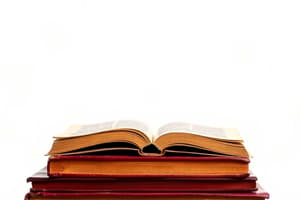Podcast
Questions and Answers
What does the term 'setting' encompass in a short story?
What does the term 'setting' encompass in a short story?
- Only the geographical location where the story takes place
- The main character's conflicts and motivations
- The emotional tone and the time the story occurs (correct)
- The plot structure and narrative style of the story
Which of the following best describes foreshadowing in literature?
Which of the following best describes foreshadowing in literature?
- Hints given by the author about future events in the narrative (correct)
- A style of writing that focuses on sensory details
- A method of revealing character backstories through lengthy exposition
- A technique used exclusively in dialogue to develop characters
What type of conflict is illustrated when a character struggles with their own feelings and thoughts?
What type of conflict is illustrated when a character struggles with their own feelings and thoughts?
- Person v nature
- Person v person
- Person v society
- Person v self (correct)
Which of the following components does NOT belong to characterization?
Which of the following components does NOT belong to characterization?
In the context of setting, which aspect does 'time span' refer to?
In the context of setting, which aspect does 'time span' refer to?
Flashcards
Setting (Time)
Setting (Time)
The time period, year, or historical context within which the story takes place. For example, "during the Victorian era" or "during the COVID-19 pandemic."
Setting (Place)
Setting (Place)
The location or setting where the story unfolds, such as a bustling city, a quiet country town, or a spaceship.
Setting (Mood and Atmosphere)
Setting (Mood and Atmosphere)
The overall mood or feeling created by the setting. This could be joyful, suspenseful, eerie, or any other emotion the author wants to communicate.
Foreshadowing
Foreshadowing
Signup and view all the flashcards
Type of Conflict
Type of Conflict
Signup and view all the flashcards
Study Notes
Short Story Elements
- Setting includes time of day, year, historical period. Examples include: during war, during COVID.
- Setting details the place where the story takes place: city, country, house, town, ocean.
- Setting includes the timeframe, social atmosphere, values, and historical contexts. Examples include: social atmosphere, values, historical context.
- Setting includes the mood and atmosphere, creating feelings like joy and calmness.
- Type of Conflict looks at person versus self conflicts (internal).
- Type of Conflict considers person versus person conflicts (external).
- Type of Conflict discusses person versus nature (external).
- Type of Conflict considers person versus society (external).
- Type of Conflict includes person versus technology (external).
- Characterization involves speech and thought processes. It describes how characters display their feelings and emotions.
- Characterization considers how characters affect each other.
- Characterization notes characters' actions and appearances (looks).
- Foreshadowing is a literary device. Authors hint at future events, building suspense or creating coherence for readers.
Studying That Suits You
Use AI to generate personalized quizzes and flashcards to suit your learning preferences.




